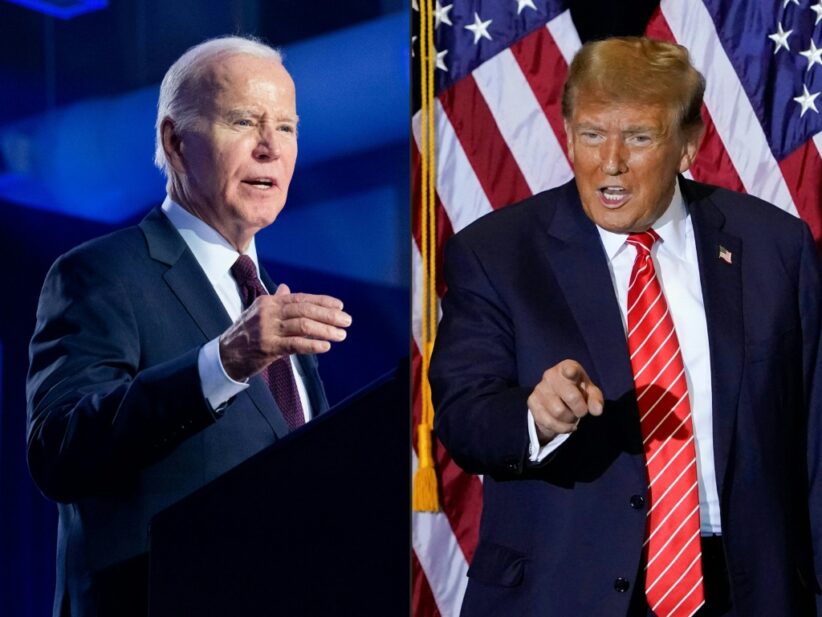US President Joe Biden and Donald Trump agreed Wednesday to hold election debates in June and September, with the rivals trading barbs about their first on-stage meetings in nearly four years.
The sudden agreement, ending months of uncertainty over whether the debates would happen at all, came after Biden, 81, challenged his scandal-tinged Republican rival to “make my day.”
Trump, 77, quickly responded that he was “ready to rumble” — and within hours CNN announced it would host the first debate in Atlanta on June 27 and ABC said it would stage the second on September 10.
With former president Trump leading polls in battleground states, Biden appeared to be trying to seize the initiative by proposing both the dates and an audience-free format for the debates.
It represents a calculated political risk against a supreme political showman, with Biden hoping to use the debates to overcome concerns about his age and remind voters of Trump’s chaotic time in the White House.
When asked by an AFP reporter if he was looking forward to the debates, Biden replied: “I am.”
Earlier, he said in a video on X: “Donald Trump lost two debates to me in 2020. Since then, he hasn’t shown up for a debate. Now he’s acting like he wants to debate me again. Well, make my day, pal.”
Biden also trolled Trump over his criminal hush-money trial in New York, which features a mid-week break, adding: “I hear you’re free on Wednesdays.”
Trump’s swift acceptance reflected the fact that Trump — who avoided any debates with his Republican rivals — has been itching to get his message out after weeks stuck in court.
“Let’s get ready to Rumble!!!” he wrote on his Truth Social app, describing Biden as the “WORST debater I have ever faced.”
“I would strongly recommend more than two debates and, for excitement purposes, a very large venue, although Biden is supposedly afraid of crowds.”
CNN confirmed there would be no audience for its June debate.
– ‘Shut up, man’ –
Both candidates shunned the traditional bipartisan commission that has run debates since 1988, and which had proposed three debates in September to October.
The first debate will be unusually early in the year, before the Republican convention in July where Trump is set to be formally anointed as the party’s candidate.
Trump later said he’d accepted a third invitation from right-wing Fox News, and his campaign called for adding debates in July and August.
Biden’s campaign poured cold water on that, with campaign chair Jen O’Malley Dillon saying the president had “made his terms clear for two one-on-one debates.”
The last debates between the two men in 2020 were tension-filled affairs, with Biden at one point snapping “will you shut up, man?” as Trump repeatedly talked over him.
It was later revealed that Trump had also tested positive for Covid shortly before that debate, without informing organizers.
This time, Biden’s campaign said it would bypass the debate commission because of its “failure” to meet the needs of voters.
The Biden campaign rejected the commission’s proposals for debate with a “raucous or disruptive” audience and wanted candidates’ microphones to be kept off when it was not their turn to speak, O’Malley Dillon said in a letter obtained by AFP.
Earlier debates would also favor early voters — who often lean Democratic.
Neither debate was set to involve independent challenger Robert F. Kennedy Jr.
Kennedy accused Trump and Biden of “colluding to lock America into a head-to-head match-up that 70 percent say they do not want,” in a statement on X.
Biden and Trump both believed they could highlight each others’ weaknesses to voters, said Ken Miller, an associate professor of political science at the University of Nevada, Las Vegas.
“My guess is that Biden wants to remind people of Trump’s abrasive personality,” he told AFP, adding that an “early debate offers Trump a rare chance to get out in front of voters.”
But the effect on voters could be negligible given that both men are known quantities.
“Presidential debates rarely have had any long-lasting effects on voters’ opinions.
Yeswecantv








